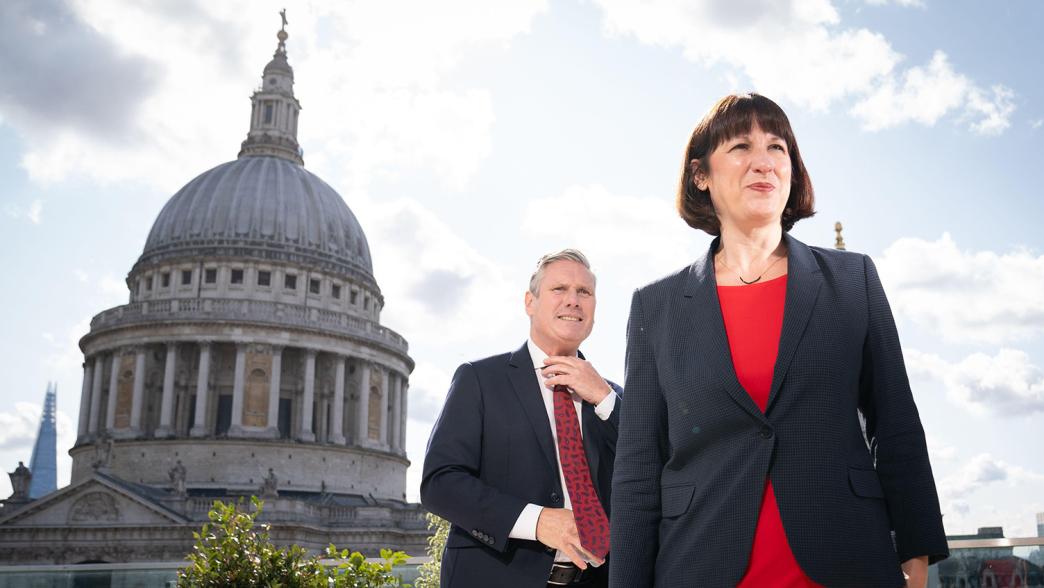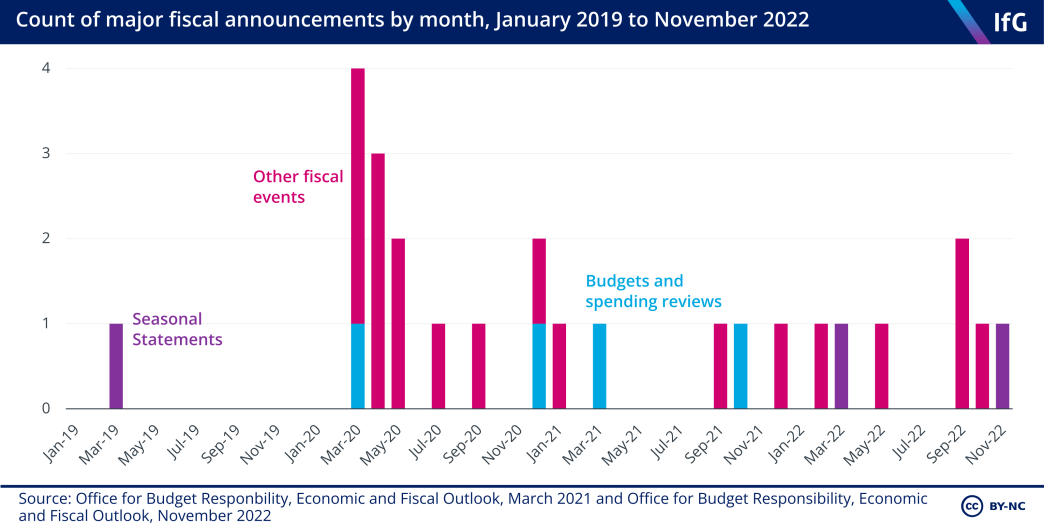Rachel Reeves has made welcome moves to improve fiscal policy making
Liz Truss's autumn mini-budget is a lesson in how not to do fiscal policy.

The shadow chancellor has set out an approach to fiscal policy which has long been called for by the Institute for Government but, says Olly Bartrum, a government committed to fiscal policy making could still go further
Shadow chancellor Rachel Reeves has announced a new ‘fiscal lock’ to guarantee that the Office for Budget Responsibility (OBR) will publish a forecast to accompany any major decision on tax and spending, with the aim of avoiding the events of last autumn where an apparent disregard for objective evidence led to a loss of faith in the UK’s fiscal policy.
However, the more significant change to day-to-day fiscal policy making is likely to come from Labour’s commitment to one major fiscal event per year – something the IfG and others have long called for. These would be welcome improvements to the fiscal framework.
Liz Truss’s mini-budget demonstrated the risks involved in sidelining the OBR
As we warned (at least twice) in the run up to the mini-budget – and echoed in subsequent commentary – Liz Truss’ approach to fiscal policy making, especially sidelining the OBR, was reckless. Whatever the merits of the policies themselves, refusing the OBR’s offer of a forecast fuelled concern about that government’s apparent disdain for independent advice, undermining the credibility of her economic and fiscal policy. This undoubtedly contributed to a sharp rise in the cost of borrowing for the government in the aftermath of the announcement.
The mini-budget also marked the fifth major fiscal announcement of 2022, following on from the spring statement and a series of ad-hoc announcements of energy support throughout the year. While it is legitimate for governments to make fiscal announcements outside of budgets to respond to urgent issues such as the pandemic or energy crisis, the recent trend of having multiple major fiscal events per year is not a good way to do fiscal policy. It creates a large degree of policy uncertainty that is harmful for the economy, consumes a lot of government time, and limits its ability to develop policy well and with a long-term focus in a strategic way and instead creates incentives for ad-hoc tinkering.

Labour’s revised charter for the OBR should improve the quality and predictability of fiscal policy as well as its credibility
It is rare that chancellors will want to disregard the OBR’s advice, with the events of last autumn only making this less likely, but Reeves’s OBR announcement is welcome.
The shadow chancellor has confirmed that Labour would implement an update to the Charter of Budget Responsibility to guarantee that the OBR can independently publish a forecast of the impact of any major fiscal event that makes permanent tax and spending changes. But while this will help to improve the credibility of the UK’s fiscal policy, it is not enough to lead to a different approach to fiscal policy making.
More significant for the quality of fiscal policy making in normal times is Reeves’s commitment to stick to a fixed timetable for budgets that would see major fiscal decisions announced by the end of November each year, with only minor policy announcements made at a spring update. This is in line with recommendations previously made in a report jointly written by the IfG, IFS and the Chartered Institute of Taxation (CIOT), and in the International Monetary Fund’s evaluation of the UK’s fiscal transparency. Fewer fiscal events would mean greater certainty and stability, release civil service resources to focus on better consultation, and produce higher quality legislation.
Past governments have said that they would do this. The most recent example is the new tax policy making timetable announced by Philip Hammond in 2017, which is still official government policy despite no chancellor since sticking to the schedule. New Labour also planned to have a single budget interspersed with ‘pre budget reports’, but this was also disregarded
Reeves’s challenge is to stick to her commitment. While she has promised only “minor policy changes at the spring update”, it is all too easy at these events for chancellors to turn ‘fiscal headroom’ into policy announcements that might generate them some favourable coverage or, in the event that forecast updates might mean that fiscal targets are missed (by a small margin), to announce hastily planned spending cuts in order to avoid narratives around fiscal black holes. Ideally it would be the norm for there to be no new announcements at the spring update, perhaps except changes to policy already announced at budget, reflecting feedback from consultation.
A government committed to improving fiscal policy making could go further
There is more that Labour could do to enhance the quality of fiscal policy making and improve public understanding of its economic approach, should it win the next general election
Governments announce large numbers of tax changes which collectively have no clear sense of overall direction. Moving to one major fiscal event should mean that there are fewer changes, and more thought-out changes, but we have long argued that chancellors should publish comprehensive tax strategies to provide a clear signal to the public, businesses and investors about how the tax system is likely to evolve. This would roll the pitch for necessary reforms and discourage ad hoc changes that go against the grain of the government’s broader plans for the system.
The OBR fulfils an important role in setting out the economic and fiscal reality that chancellors face, but in doing so it can cause ministerial headaches and, as we have seen, a temptation to sideline the institution. So it is reassuring that Labour has committed to prevent that from happening. It signals that it is serious about improving fiscal policy making, and these first steps are ones the IfG has long called for. There is, however, more that could be done.
- Topic
- Public finances Policy making
- Keywords
- Economy
- Political party
- Labour
- Public figures
- Keir Starmer Liz Truss
- Publisher
- Institute for Government